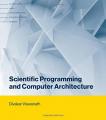
Specifying Systems
by Leslie Lamport
Publisher: Addison-Wesley Professional 2002
ISBN/ASIN: 032114306X
ISBN-13: 9780321143068
Number of pages: 382
Description:
This book shows how to write unambiguous specifications of complex computer systems. The first part provides an introduction to specification, explaining how to describe the behavioral properties of a system. The second part covers liveness and fairness, real-time properties, and composition. Final two parts provide a complete reference manual for the TLA+ language and tools, as well as a handy mini-manual.
Download or read it online for free here:
Download link
(2.5MB, PDF)
Similar books
 Scientific Programming and Computer Architecture
Scientific Programming and Computer Architectureby Divakar Viswanath - The MIT Press
This book examines and explains a variety of scientific programming models with an emphasis on how programming constructs map to different parts of the computer's architecture. Two themes emerge: program speed and program modularity.
(6403 views)
 Knowware: the third star after Hardware and Software
Knowware: the third star after Hardware and Softwareby Ruqian Lu - Polimetrica
This book proposes to separate knowledge from software and to make it a commodity that is called knowware. The architecture, representation and function of Knowware are discussed. The principles of knowware engineering are analyzed.
(12078 views)
 Software Architecture
Software Architectureby A. Bijlsma, B.J. Heeren, E.E. Roubtsova, S. Stuurman - FTA
The central theme of this book is balancing the concerns and requirements of stakeholders, combining these into an architecture proposal by employing known tactics and patterns, producing a description of the architecture that can be communicated.
(14160 views)
 A Gentle Guide to Constraint Logic Programming via ECLiPSe
A Gentle Guide to Constraint Logic Programming via ECLiPSeby Antoni Niederlinski
Introductory and down-to-earth presentation of Constraint Logic Programming, an exciting software paradigm, more and more popular for solving combinatorial as well as continuous constraint satisfaction problems and constraint optimization problems.
(10569 views)